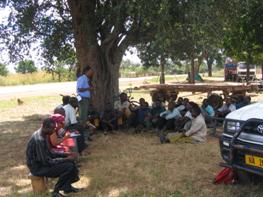Malawi
| |
|
Description
Malawi is one of the more drought-prone countries in the Southern African region, and it’s predominantly smallholder farmers are severely affected by rainfall risk resulting in food insecurity. Droughts not only are a source of risk of food shortage, but also inhibit farmers from planting higher yield hybrid seeds. Smallholder farmers lack traditional collateral and often have a limited credit history, and rural banks thus are reluctant to issue credit to the heavily exposed agricultural sector. Without credit, farmers cannot obtain the capital to purchase high-yield seeds. The Commodity Risk Management Group (CRMG) at the World Bank in collaboration with local stakeholders piloted a rainfall index-based weather insurance scheme in Malawi for the 2005/2006 crop season in order to enhance groundnut farmers’ ability to manage drought risk and, in turn, access credit. Index-based contracts as an alternative to traditional crop insurance have the advantages of greatly limiting transaction costs (from reduced claims handling) and eliminating moral hazard (claims are independent of the farmers’ practices), but a disadvantage is their potential of a mismatch between yield and payout, or basis risk.
 Although it is too early to judge the performance of the Malawi pilot project, the insurer-NGO-donor partnership, by increasing the productivity of farmers and perhaps eventually providing cash in times of food shortage, may have great potential in providing a greatly needed safety net for smallholder farmers. Such donor-supported pilot schemes, if they can be scaled up to create a sufficiently diversified pool, hold large promise for the more than 40% of farmers in developing countries who face threats to their livelihoods from adverse weather.
Although it is too early to judge the performance of the Malawi pilot project, the insurer-NGO-donor partnership, by increasing the productivity of farmers and perhaps eventually providing cash in times of food shortage, may have great potential in providing a greatly needed safety net for smallholder farmers. Such donor-supported pilot schemes, if they can be scaled up to create a sufficiently diversified pool, hold large promise for the more than 40% of farmers in developing countries who face threats to their livelihoods from adverse weather.
RAV’s project “The Feasibility of risk financing schemes for climate adaptation: the case of Malawi” funded by the World Bank Development Research Group (DEC) as part of a larger research program on Institutions for Climate Change Adaptation, address three questions:
(1) what is the potential of the Malawi pilot project in reducing vulnerability and poverty of low-income and poor farmers?(2) what are the main determinants of the scheme’s longer-term viability, and
(3) what lessons can be learned from the Malawi project for “scaling up” index-based weather insurance? Attention will also be given to the views of stakeholders on the desirability and viability of the insurance scheme, and to explaining the (anticipated) plurality of views in terms of stakeholder interests, worldviews and socio-economic context.
Funding agency:
The World Bank
IIASA Researchers:
Joanne Bayer
Reinhard Mechler
Pablo Suarez
Stefan Hochrainer
For more information, contact Reinhard Mechler.
Responsible for this page: Jun Watabe
Last updated:
24 Feb 2011
Phone: (+43 2236) 807 0
Copyright © 2009-2011 IIASA